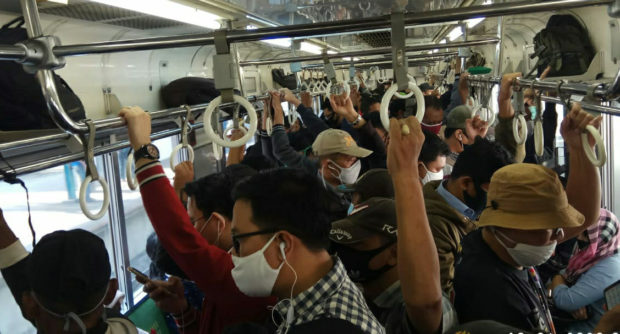‘New normal’ exposes Jakarta’s poor railway infrastructure

Passengers stand in a packed commuter line train connecting Bogor, West Java and Jakarta on June 10. Commuter line operator PT Kereta Commuter Indonesia (KCI) reported that passenger numbers surged to 279,000 on June 9 alone, from 80,000 per day on average during the large-scale social distancing (PSBB), as the government began to reopen the economy. Personal documentation/Seno Adi via The Jakarta Post/Asia News Network
JAKARTA — Train passengers in Greater Jakarta have been struggling with their daily commutes during the so-called “new normal”, as long lines and crowded stations highlight the ongoing issues relating to the lack of public infrastructure and transportation facilities in the densely populated capital.
Commuter line operator PT Kereta Commuter Indonesia (KCI) reported that passenger numbers surged to 279,000 on June 9 alone, from 80,000 per day on average during the large-scale social distancing (PSBB), as the government began to reopen the economy.
However, with health protocols in place to avoid COVID-19 transmission, the company has limited passenger numbers to 40 percent of total capacity for each trip, leading to packed stations across the region.
Seno Adi, 47, who lives in Bogor, West Java, and travels to Jakarta daily for work, lamented the long line in the morning to board a train, while he also struggled with the packed cars that made it difficult to maintain social distancing to avoid COVID-19 transmission.
“There were around 95-100 people in one carriage and people stood so close to each other. It made the carriage so crowded and it was difficult to keep our distance,” he told The Jakarta Post on June 11.
Article continues after this advertisementKCI maintains that although the company has increased the number of daily trips to 935 trips from 784 trips per day prior to the PSBB relaxation, while also increasing the number of cars on each train, the passenger crowding is “inevitable”.
Article continues after this advertisement“The long lines and crowding are hard to avoid if the pattern of commuter activities is still focused on the busy hours in the morning and afternoon,” KCI vice president for corporate communication Anne Purba said in a statement on June 7.
She stated that the company had reached maximum optimization of its facilities, with a five-minute headway for the busy line connecting Bogor and Jakarta, among other lines. The company runs 124 morning trips and 126 afternoon trips during the rush hours.
“On the Bogor line, it is so difficult to add more trips because the headway is at the maximum capacity of the available railway infrastructure. Some railway tracks are also shared with other rail services such as intercity trains and freight trains,” she added.
The Greater Jakarta commuter line saw daily passenger volume jump to over 979,000 in 2019 from around 922,000 in 2018.
However, the rail infrastructure development needed to meet this increase is still lagging behind.
The projects include the double-double track (DDT) railway project connecting Manggarai, South Jakarta, and Cikarang, West Java, as well as the separation between the Bogor line and the railway line to Bekasi, West Java, at Manggarai Station, with the latter set to be completed by year end.
“With the line separation [between the Bogor and Bekasi lines], the [commuter] train delays at Manggarai Station can be overcome,” Transportation Ministry Director General for Railways Zulfikri said on June 13.
Meanwhile, he said that the government was pursuing the completion of the DDT project by 2021.
The DDT railway development, initiated in 2002, is intended to separate the tracks for long-haul trains, and the commuter line, as well as the airport railway, to reduce delays and increase rail capacity.
Meanwhile, another infrastructure project, the light rail transit (LRT), expected to connect cities in Greater Jakarta, has been delayed until 2022, from its initial scheduled completion in November 2021.
State construction firm Adhi Karya, the project developer, cited the pandemic and land clearance as the reasons behind the postponement.
With the current gap between demand and the available infrastructure on the railways, experts have called on the government to intervene to safeguard passengers’ health.
“Trips must be more evenly spread throughout the day. For example, institutions and employers could implement flexible working hours so people don’t share the same working hours in the morning,” Bandung Institute of Technology urban transportation researcher Puspita Dirgahayani said on June 10.
Meanwhile, the Coordinating Maritime Affairs and Investment Ministry has stated that the government has intervened through the issuance of circular letter no. 8/2020 by the COVID-19 task force, which mandates the staggering of working hours for civil servants, state-owned enterprises employees and private employees.
“This is what we can do as we can’t add more transportation facilities, it has already reached maximum [capacity],” the ministry’s deputy of infrastructure and transportation coordination Ridwan Djamaluddin said on Monday.
For more news about the novel coronavirus click here.
What you need to know about Coronavirus.
For more information on COVID-19, call the DOH Hotline: (02) 86517800 local 1149/1150.
The Inquirer Foundation supports our healthcare frontliners and is still accepting cash donations to be deposited at Banco de Oro (BDO) current account #007960018860 or donate through PayMaya using this link.